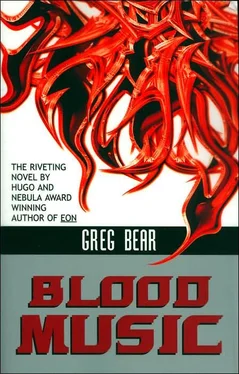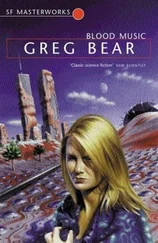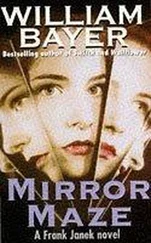Gregory Bear - Blood Music
Здесь есть возможность читать онлайн «Gregory Bear - Blood Music» весь текст электронной книги совершенно бесплатно (целиком полную версию без сокращений). В некоторых случаях можно слушать аудио, скачать через торрент в формате fb2 и присутствует краткое содержание. Город: New York, Год выпуска: 2005, ISBN: 2005, Издательство: ibooks, Incorporated, Жанр: Фантастика и фэнтези, на английском языке. Описание произведения, (предисловие) а так же отзывы посетителей доступны на портале библиотеки ЛибКат.
- Название:Blood Music
- Автор:
- Издательство:ibooks, Incorporated
- Жанр:
- Год:2005
- Город:New York
- ISBN:1596871067
- Рейтинг книги:4 / 5. Голосов: 1
-
Избранное:Добавить в избранное
- Отзывы:
-
Ваша оценка:
- 80
- 1
- 2
- 3
- 4
- 5
Blood Music: краткое содержание, описание и аннотация
Предлагаем к чтению аннотацию, описание, краткое содержание или предисловие (зависит от того, что написал сам автор книги «Blood Music»). Если вы не нашли необходимую информацию о книге — напишите в комментариях, мы постараемся отыскать её.
Blood Music — читать онлайн бесплатно полную книгу (весь текст) целиком
Ниже представлен текст книги, разбитый по страницам. Система сохранения места последней прочитанной страницы, позволяет с удобством читать онлайн бесплатно книгу «Blood Music», без необходимости каждый раз заново искать на чём Вы остановились. Поставьте закладку, и сможете в любой момент перейти на страницу, на которой закончили чтение.
Интервал:
Закладка:
26
Paulsen-Fuchs told Uwe to pause at the top of the hill. The camps of protestors around Pharmek’s compound had doubled in size in just a week. There were now about a hundred thousand, a sea of tents and flags and banners, most on the eastern side of the compound, near the main gates. They didn’t seem to be any particular organization to their protest which worried him. They were not political—just a cross section of the German people, driven to distraction by disasters they could not comprehend. They came to Pharmek because of Bernard, not yet knowing what they wanted to do. But that would change. Someone would take charge, give them a direction.
Some of the more ignorant of the public were demanding Bernard’s destruction and the sterilization of the containment chamber, but that wasn’t likely. Most European governments acknowledged that research on Bernard could be the only way to study the plague and find out how to control it.
Still, Europe was in the grip of panic. A great many travelers—tourists, businessmen, even military personnel—had returned to Europe from North America before the quarantine. Not all of them had been rounded up. Some had been found undergoing transformation in hotels, apartments, houses. Almost invariably the victims were killed by local authorities, the buildings carefully incinerated and sewage and water systems liberally dosed with sterilizing agents.
Nobody knew whether such measures were effective.
Many people, around the world, were convinced it was just a matter of time.
With the news he had received that morning, he halfway hoped they might be right. Plague might be preferable to suicide. “North gate,” Paulsen-Fuchs said, getting back into the car.
The equipment had finally been delivered and now crowded half the containment chamber. Bernard rearranged the cot and desk and stood back, looking at the compact laboratory with satisfaction. Now at least he would have something to do. He could poke and prod himself.
Weeks had passed and he had still not undergone the final transformation. No one outside could tell him why; nor could he explain to himself why he had not yet communicated with the noocytes, as Vergil had. Or thought he had.
Perhaps Vergil had simply gone insane. Communication might not be possible.
He needed far more equipment than could be crammed into the chamber, but most of the chemical analysis he was planning could be done outside and the information fed into his terminal.
He felt something like the old Michael Bernard now. He was on a trail. He would find out or help the others discover how the cells communicated, what chemical language they used. And if they would not speak with him directly, he would then find a way to speak to them. Perhaps control them. Pharmek had all the necessary expertise and equipment, everything Ulam had had and more; if necessary, they could duplicate the experiments and start from scratch.
Bernard doubted that would be allowed to happen. From conversations with Paulsen-Fuchs and other Pharmek personnel, he had the impression there was quite a storm raging around him now.
After running a brief inventory on the equipment, he began refreshing his memory on procedures by reading the manuals. A few hours later he tired of that and made an entry in his computer notebook, knowing that it was not private, that it would be read now or later by Pharmek and government personnel—psychologists perhaps, the doctors certainly. Everything about him was important now.
There is no biological reason I am aware of why the Earth has not already succumbed. The plague is versatile, can transform any living thing. But Europe remains free—except for scattered incidents—and I doubt it is because of their extreme measures. Perhaps the answer to why I am atypical of recent victims—why I am undergoing changes more like Vergil Ulam’s—will explain this other mystery, as well. Tomorrow I will have the experts take blood and tissue samples from me, but not all of the samples will be removed from the chamber. I will work on some of them myself, particularly blood and lymph.
He hesitated, fingers over the keyboard, and was about to continue when Paulsen-Fuchs buzzed for his attention from the viewing chamber.
“Good afternoon,” Bernard said, spinning his chair around. As usual now, he was naked. A camera in the upper right hand corner of the viewing chamber window continually fed his body contours and characteristics into the computers for analysis.
“Not a good afternoon, Michael,” Paulsen-Fuchs said. His long face was even longer and more haggard than usual. “As if we do not have problems enough, now we face the possibility of war.”
Bernard stepped close to the window and watched the executive shake out a British newspaper. The headlines sent a queasy thrill down his spine.
“When?” he asked.
“Yesterday afternoon. The Cubans reported a radioactive cloud advancing across the Atlantic. NATO military satellites confirmed the hot-spot. I suppose the military knew ahead of time—they must have their seismographs or whatever—but the press only found out this morning. The Russians used nine or ten one-megaton bombs, probably submarine-launched. The whole canal area is…” He shook his head. “Nothing from the Russians. Half the people in Germany expect we will be invaded within the week. The other half are drunk.”
“Any word on the continent?” That was how they had come to refer to North America in the last two days: the continent, the real center of the action.
“Nothing,” Paulsen-Fuchs said, slamming the paper on the viewing chamber table.
“Do you—the Europeans—expect the Russians to invade North America?”
“Yes. Any day now. Eminent domain, or whatever you English-speakers call it. Right of salvage.” He began to chuckle. “I am not their lawyer, but they will think of the correct words, and justify themselves in Geneva, if they haven’t bombed Geneva by then, too.” He stood with his hands spread on the table, around the paper. “No one is prepared to discuss what will happen to them if they do invade. The U.S. government in exile postures and threatens with its European-based troops and navy, but Russia does not take them seriously. Before your call last month, I had planned to go on my first vacation in seven years. Obviously, I cannot go on vacation,” he said. “Michael, you have brought something into my life that may kill me. Pardon my self-centered moment.”
“Understood,” Bernard said quietly.
“Old saying in Germany,” Paulsen-Fuchs said, staring at him. “ ‘It is the bullet you don’t hear that gets you.’ Does that have meaning for you?”
He nodded.
“Then work, Michael. Work very hard, before we are all dead by our own hand.”
27
At the security desk Suzy found a long, powerful flashlight—very fancy, black like binoculars with a beam that could be spread wide or focused in by turning a knob—and set about exploring the concourse and lower-level walkway between the two towers. She spent some time trying on clothes in a boutique, but she couldn’t see herself very well in the flashlight beam and that quickly palled. Besides, it was spooky. She made a half-hearted effort to see if others like herself had entered the building, and even ventured briefly into the Cortlandt Street subway station. When she was satisfied that the lower floors were empty—except for the ubiquitous piles of clothes—she returned to her Candlelight Room, as she had dubbed it, and planned her ascent.
She had found a chart of the north tower and now traced her finger along the plan of the lobby and lower floors. Flipping back each sheet of the thick manual, she realized that the building did not have long stairwells, but stairs at different places on each floor.
Читать дальшеИнтервал:
Закладка:
Похожие книги на «Blood Music»
Представляем Вашему вниманию похожие книги на «Blood Music» списком для выбора. Мы отобрали схожую по названию и смыслу литературу в надежде предоставить читателям больше вариантов отыскать новые, интересные, ещё непрочитанные произведения.
Обсуждение, отзывы о книге «Blood Music» и просто собственные мнения читателей. Оставьте ваши комментарии, напишите, что Вы думаете о произведении, его смысле или главных героях. Укажите что конкретно понравилось, а что нет, и почему Вы так считаете.












